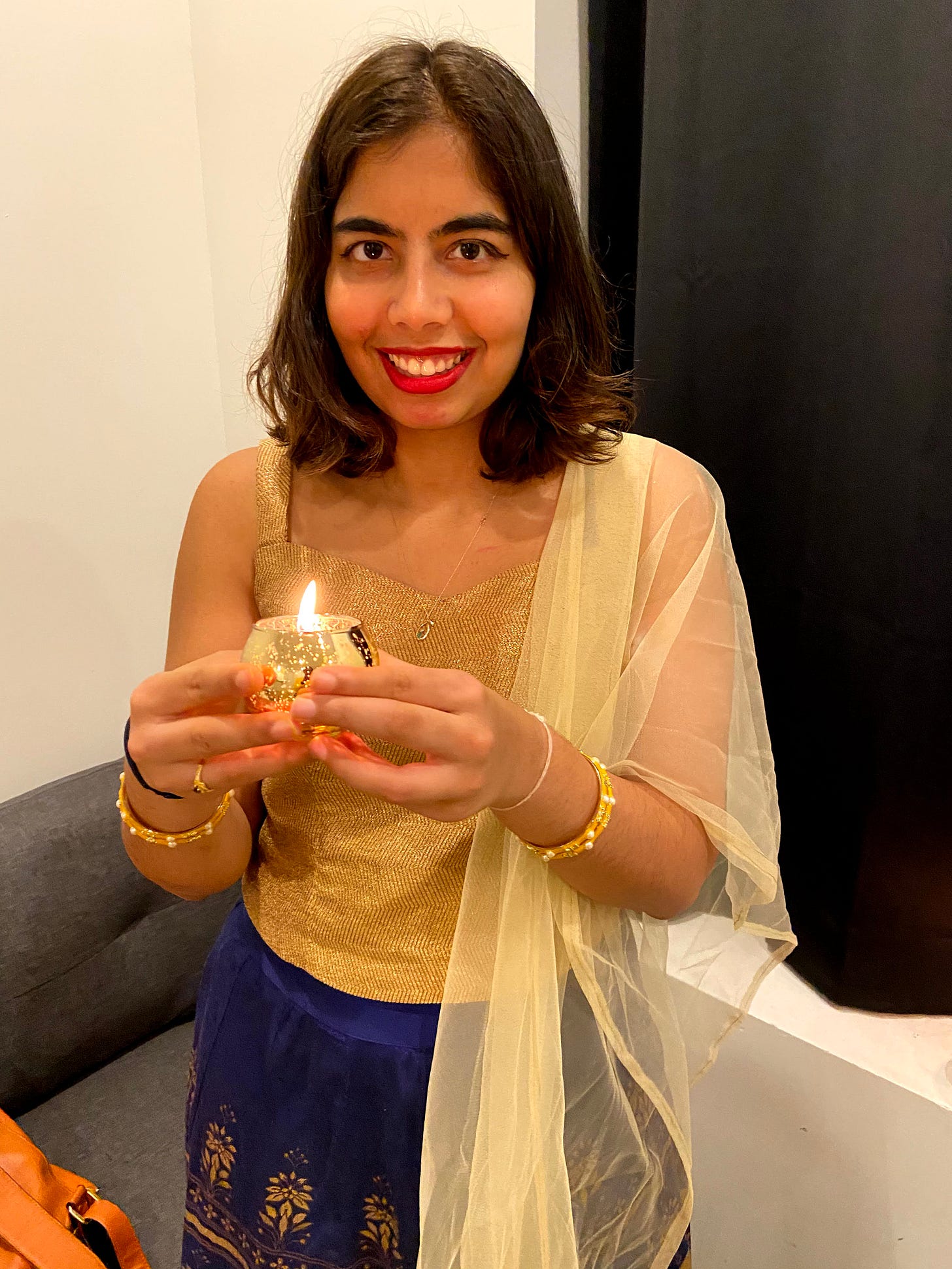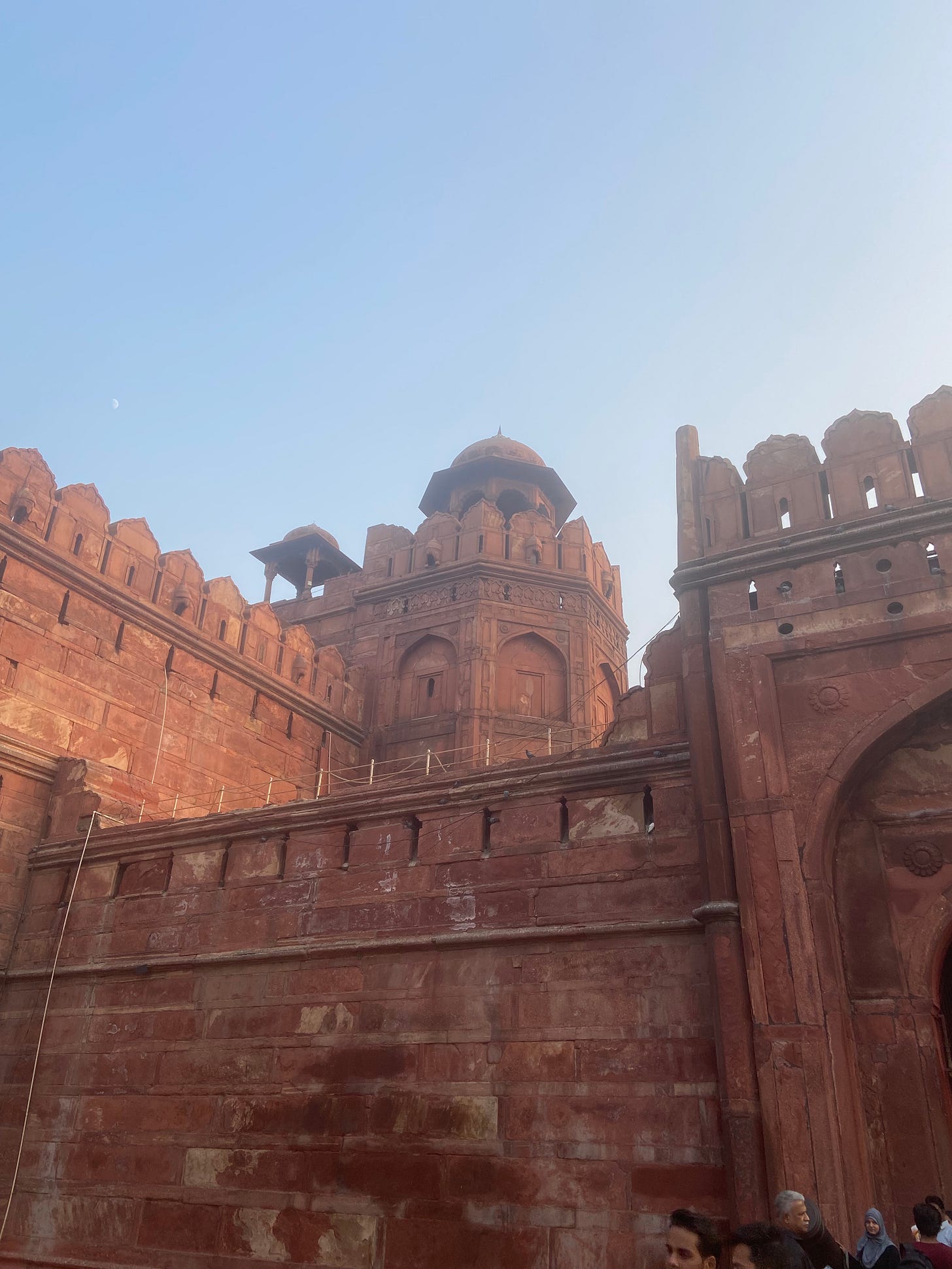I'm a "Bad Hindu"
On my quest to deepen my relationship with my religion, culture, and spirituality.
If my culture were a person, our relationship status would be “It’s complicated.”
On the one hand, there’s so many things to love about being Indian: the food (hot take: 70% of Indian food in NYC is garbage, but there are a few gems like Angel in Jackson Heights). The music (I have a playlist of Bollywood Bangers, convince me that it’s not better than 70% of mainstream pop). The values (education and family as two big ones). The drinks (not just lassi and please don’t call chai “chai tea”). The clothing (hot take: bright colors are sorely missing from Western fashion). The languages (350+ languages and counting). The connection to one of the oldest civilizations to grace the planet.
But there’s an elephant in the room: religion. Hinduism is arguably one of the biggest tenants of my cultural identity, yet it feels the most ambiguous. I feel foreign to my own religion, either because I don’t know much about it or don’t identify with it. When people ask me the meaning behind different festivals, I can parrot the simplified answers my parents have given me, but I don’t know if I fully understand the significance behind them in a way that feels connected to my “spirituality,” whatever that means.
In other words, I’m a bad Hindu.
For example: I call Diwali “brown Christmas” because it’s the most important festival for my family. But why does the festival matter so much to Indian people? Because that’s when good triumphs evil in the Ramayana. But I don’t know much beyond that. Plus, while I relate to the festival culturally, the religious aspects feel outdated. For example, many of the Diwali ceremonies (like throwing stuff at the Gods or chanting prayers) have an inherent pecking order where men and elders go first, then women and younger folks. It has always bothered me, this inherent hierarchy of “worthiness” baked into the culture, a reflection of centuries old patriarchy.
If I look back, most of my connections to Hinduism were tied to obligations or requirements imposed by others, rather than driven by my personal curiosity. As a child in India, Hinduism was everywhere, so it was hard to escape it. When I moved to the US, my parents were worried that I’d lose access to my heritage, so they made it a special point to find ways to expose me to Hinduism. Every Sunday, my parents drove two hour from the Bronx to Long Island to visit our local ashram. Once we got there, it was two hours of adults chanting, and I was forced to participate, even though I had no idea what we were saying. Then it was helping cook and serve food (aka seva). It also took forever to leave, as my parents would often get sidetracked in conversation with other people. I didn’t connect with any of the kids or adults, who lived in the posh upper middle class world of Long Island. Eventually, I skipped attending, using school or faking illnesses to get out of the obligation.
School didn’t really help me better understand my own religion. Back in India, we used to say religious prayers in school. When I moved to the US, in my history or English Lit classes, we talked a lot about Christianity or Judaism, but Hinduism was always a side unit. Plus, it wasn’t cool to talk about religion, especially religion that was viewed as “different” than the mainstream culture. I vividly remember at ten years old, when I accompanied my mother, dressed in traditional Indian garb, wanting to disappear because I could feel the heat of everyone’s eyes and judgment on us. Looking back, I think young me internalized that my religion and culture were inherently less important and valuable, and so I deprioritized deepening understanding my own heritage and religion.
As an adult, things feel different. I remember when I was first moving to New York City, I got coffee with one of my high school friends. Her first question: what does spirituality in your life look like? It was the first time I ever confronted the notion of spirituality in my life. Since then, I’ve been on a quest to chase the answer to that question to make sense of my world. Ironically, many of the “spiritual” elements that resonate with me have some tie-in to Hinduism. I regularly come back to principles like karma or reincarnation to orient my moral compass, prioritizing kindness and doing good. I regularly meditate and do yoga to feel connected to my own body and mind. I look forward to festivals like Holi and Diwali to express and celebrate my heritage, and actually pay attention to the stories my mom narrates during the ceremonies. While this is great, a lot of these changes have come from other, non-Indian people in my life, a fact that embarrasses me. After all, shouldn’t I know more about my own culture than other people?
I felt this desire most intensely when I visited Delhi in November 2022 for my cousin’s wedding. I spent a day with my mom, and she took me around the city, showing me spots from her childhood. It was one of the most special days of the year, as I got to see the city through my mother’s eyes, including a temple where my mom spent a lot of her free time as a young kid. I could feel the power of the place as I walked through the marbled floors. I saw inscriptions on the wall from the Bhagavad Gita. I was embarrassed that I needed to read the English translation. I completed my rounds of the deities, and I felt a genuine curiosity to deepen my knowledge, if not to connect with my mom, but to better connect with a part of myself that was buried for so long.
So, I’m taking one small step towards overcoming this bad Hindu guilt. One of my goals this year is to read the Bhagavad Gita, and finally understand a) what this book is about b) complete my mom’s biggest feature requests and C) get some context on the philosophical aspect of Hinduism, rather than just the lore or rituals. I’m actually excited for this, because I think this will help articulate values that I dearly hold but don’t have the words for. Or values that I’ve lost since I was a ten year old girl, floating for a sense of identity and meaning in this world. It’s ironic because I find myself very much in that same exact spot right now, figuring out what I want to prioritize in the next phase of my life.
Some days, this spirituality journey feels overwhelming. I fear that it’s too late, that there’s too much knowledge and context that I’ve missed. I fear that I’ll be a bad Hindu forever, bringing shame to my ancestors. I fear that I’ll try and feel repelled, or follow the path of others rather than my own. Yet I know that there’s value in the process itself. Perhaps I’ll be a bad Hindu forever. But there’s some pride in that, to know that at the very least, I tried.
Thing of Note
Recap: This section is my way of bringing attention to a thing, person, or idea that’s meaningful/related to the mission of this newsletter. This week, I want to highlight Kasra’s essay on inflection points.
I love this essay in particular because I feel like it makes a good case for how to approach goal setting. Do the things that call to you rather than setting explicit goals that is set by working backwards from some end outcome. While this is hard for Type A me to internalize, I’ve adopted a compromise of Kasra and my approach. I try to approach goals as less “goals” in an OKR/KPI setting but more as intentions, a compass that gives me a north star to guide my daily, weekly, and monthly decision making.
Thanks for Reading!
I’m on a journey to create a blended career across the creative arts, tech, and business. This newsletter is my way of sharing my reflections, thoughts, and advice along the way. Here are some ways to support or further collaborate together!
I would love feedback on this post.
If you want to see more content like this, heart the post.
Hearing from readers also gives me a ton of energy. Drop a comment with thoughts on your spirituality journey, or building a deeper understanding of your own religion.
If you’re figuring out your own career transition or looking for more support in your product career, consider working with me as a coach. Here’s my calendly if you want to get the ball rolling.






"Brown Christmas" made me LOL
I really look forward to hearing your thoughts on the Bhagavad Gita as cast through your new and evolving viewpoint on things ;D If your intuition is leading you to do so, follow it. There's a message on the other side of doing so, I'm sure.
A Koan to consider: what if being a "bad Hindu" meant you became good at being Vinamrata? OR, what if becoming a "good Hindu" was the path to becoming Vinamrata?
Great writing. I loved the opening.
I was actually heartened by your open minded perspective. Thank you.
Hinduism doesn’t have those good or bad judgements. It gives you the freedom to be free and find your own path. Even if it happens to be Nastik Carvakas.
So many younger Hindus are ashamed of their own culture and religion because of the negative narratives by those who do not understand.
I found an overall perspective and understanding of Sanathan Dharma very well articulated in Rajiv Malhotra’s book Being Different.
https://www.amazon.com/gp/aw/d/B005UQ3YT8/ref=tmm_kin_swatch_0?ie=UTF8&qid=1695275057&sr=8-1
Jay Lakhani who sadly passed away did a great series of You tube videos on Hinduism and also taught Hinduism at Eton College UK
https://youtu.be/kHPzHXMNAqs?si=Vs_Mz6-Ldz-26tZb
Many Hindu Parents especially those from India assume their American Born kids will absorb values and understanding of Hinduism by Osmosis. In many cases its not true. As my grandad used to say… your generation will be lost and lose their identity amongst others. I hope more Young Hindus will have the courage to look beyond tropes.